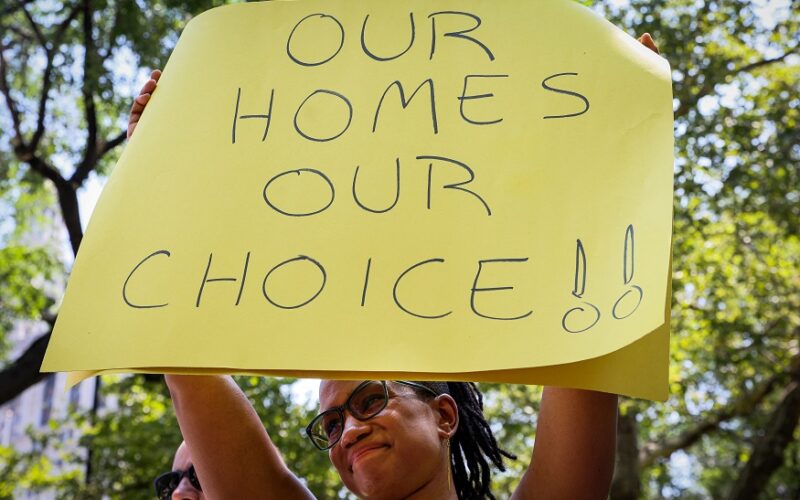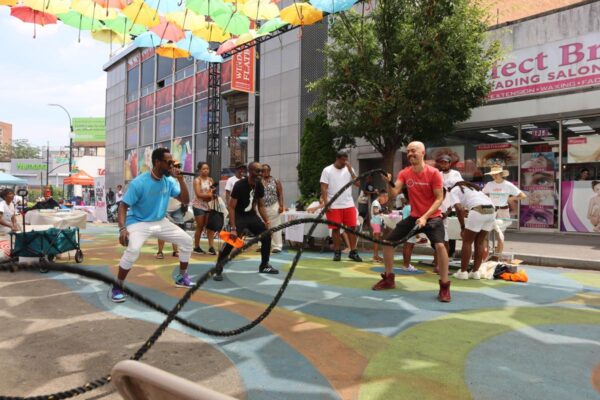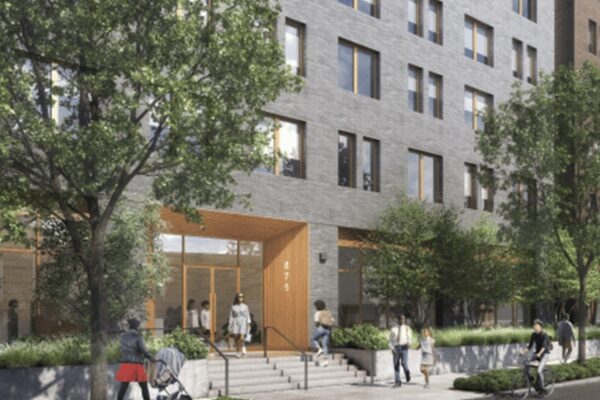In a city that prides itself on its diversity and progressive values, something troubling mires the seemingly well-intentioned policies of the Democratic Party and its progressive allies. The battleground? New York City’s neighborhoods, particularly those inhabited by Black and Latino communities who have long struggled against the forces of gentrification. The weapon? A seemingly well-intentioned law that was touted as a means to stop “illegal hotels” and address the housing shortage. However, as enforcement takes hold, the unintended consequences reveal a harsh reality: the very people it aims to protect are the ones facing the brunt of its impact. As a result, many of them are facing eviction from their own neighborhoods.
Championed by NYC Democrats, the Short-Term Rental Registration Law, also known as Local Law 18, was passed in January 2022 after years of lobbying by the Hotel Trades Union, while also sparking hopes of rectifying the housing crisis gripping the city. But, as the regulations were crafted by the Mayor’s Office Of Special Enforcement (OSE), it became evident that the lion’s share of the burden would fall on the shoulders of unsuspecting homeowners, primarily from marginalized communities. The legislation mandated the registration of short-term rentals, targeting properties available on platforms like Airbnb and VRBO. Yet, the Mayor’s Office of Special Enforcement’s rulebook has turned into a blueprint for exclusion, snuffing out small homeowners’ ability to participate in short-term rentals while shielding wealthy investors and hoteliers.
The ones hardest hit by this de facto ban? Long-standing Black and Latino residents, already grappling with dwindling government resources in their neighborhoods while facing the relentless march of developers gobbling up their neighborhoods. According to applicants, the regulation standards required for OSE application approval are extremely confusing, onerous and expensive, automatically disqualifying more than 80% of small homeowner applicants thus far, and tentatively more than 90% of the existing private homeowner hosts to date. Sadly, Democrats and progressives, who once championed the underprivileged, have inadvertently found themselves on the other side of the fight, aligning with the same interests they sought to oppose. Under the guise of combating the “big bad Airbnb corporation,” they’ve inadvertently aided the hotel industry and exacerbated the housing crisis.
With enforcement set to begin September 5th, 2023, the narrative being spun by mainstream media only further adds to the irony of this situation. The spotlight shines on a few bad actors, ignoring the fact that nearly 80% of Airbnb’s hosts in NYC are individuals seeking to make ends meet. These homeowners, often people of color, aren’t greedy moguls but ordinary citizens, many of whom are our friends and neighbors simply trying to stay afloat in a city that’s becoming increasingly unaffordable. Most 1 and 2 family homeowners have only one registered listing on Airbnb. Meanwhile, the individuals who were touted as the “culprits” of the illegal hotel industry by former Mayor Deblasio, NYC Public Advocate Jumaane Williams and current Mayor Eric Adams were wealthy multiple dwelling owners and real estate investors who leased dozens of apartments across the city in multi-million dollar commercial STR enterprises. These individuals, while accounting for 20% of Airbnb hosts, represent more than 50% of the STR revenue made by the corporation in NYC. In other words, the overwhelming majority of hosts aren’t the problem!
Rather than solving the housing shortage, Local Law 18 has only deepened the divide between the haves and the have-nots. While proponents argue that it addresses the city’s housing crisis, its impact is clear—it doesn’t. Rent-stabilized apartments are intentionally left vacant by NYC landlords, manipulating the housing availability numbers to justify rising prices. Developers seize historically marginalized neighborhoods to build luxury apartments and displace long-time residents, all while token “affordable housing” units remain far from attainable. According to recent data, More than 60,000 rent-stabilized apartments are currently being held intentionally vacant, a staggering number that contradicts the city’s purported scarcity. Meanwhile, developers capitalize on these distortions, erecting towering edifices that cast shadows over once-vibrant communities. Luxury apartments rise, promising an elitist lifestyle, while affordable housing remains an elusive mirage.
Through all the statistics and census data peddled by hotel lobbyists and city officials in support of L.L.18, they all have failed to account for this “warehousing” of rent-stabilized apartments, as well as the heavy influx of private equity investors purchasing residential properties for the purpose of high-priced long-term rentals. The issue in New York City isn’t just a lack of “availability” of housing—it’s the lack of affordability, being driven by institutional investors gobbling up all of the real estate in our city.
By penalizing everyday homeowners who share their living spaces to make ends meet, policies like L.L.18 cast a blind eye to the larger players benefiting from the city’s alleged housing crisis. It is also wrong to label 1 and 2 family properties as de facto “housing stock” for New York City’s long term rental market, which is essentially defined by properties governed under state multiple dwelling laws. According to advocacy groups and organizations like Restore Homeowner Autonomy & Rights NYC (RHOAR), where 72% their self-reported homeowners already use their second units for family members and personal use, and New York Homeowners Alliance, where more than 80% of their 2-family dwelling owners report to have no intention of renting the units in their homes to long term tenants, Local Law 18 scapegoats the New York City housing issues to the middle class, instead of the wealthy power brokers reshaping the Big Apple for the elite.
In this era of political upheaval, where allegiance to ideologies often blinds us to the real-world implications of our decisions, it’s time for a reevaluation. Crafting legislation should prioritize critical thinking over knee-jerk reactions, and advocate for the marginalized instead of inadvertently exacerbating their struggles. A crucial amendment to Local Law 18, exempting small 1 and 2 family homeowners from registration and enforcement, is the step toward rectifying this misguided policy.
This amendment will not only eliminate the worst offenders of short-term rentals but also offer a lifeline to the working class and minority homeowners battling gentrification. By encouraging responsible short-term rentals, these individuals can continue contributing to their neighborhoods’ revitalization, stimulating local economies and offering tourists a unique slice of life beyond the confines of Manhattan’s hotels.
The city’s well-being hinges on its ability to welcome tourists, with hotels at near full capacity. Short-term rentals have become an integral part of this equation, providing a lifeline for everyday homeowners while allowing tourists to explore diverse neighborhoods. As Local Law 18 takes effect, it inadvertently sends a chilling message to potential visitors: New York City is no longer open for business.
In the end, it’s time to acknowledge the seemingly endless stream of unintended consequences of our politics and prioritize the very communities we aim to protect. Local Law 18, while a step in the right direction, has veered off course, jeopardizing the livelihoods of the city’s most vulnerable. The path forward requires a reassessment of priorities, a reevaluation of the narrative, and a resolute commitment to crafting policies that uplift rather than displace. It’s time for New York to reclaim its progressive spirit and ensure that its diversity and inclusivity remain more than just empty promises.





















